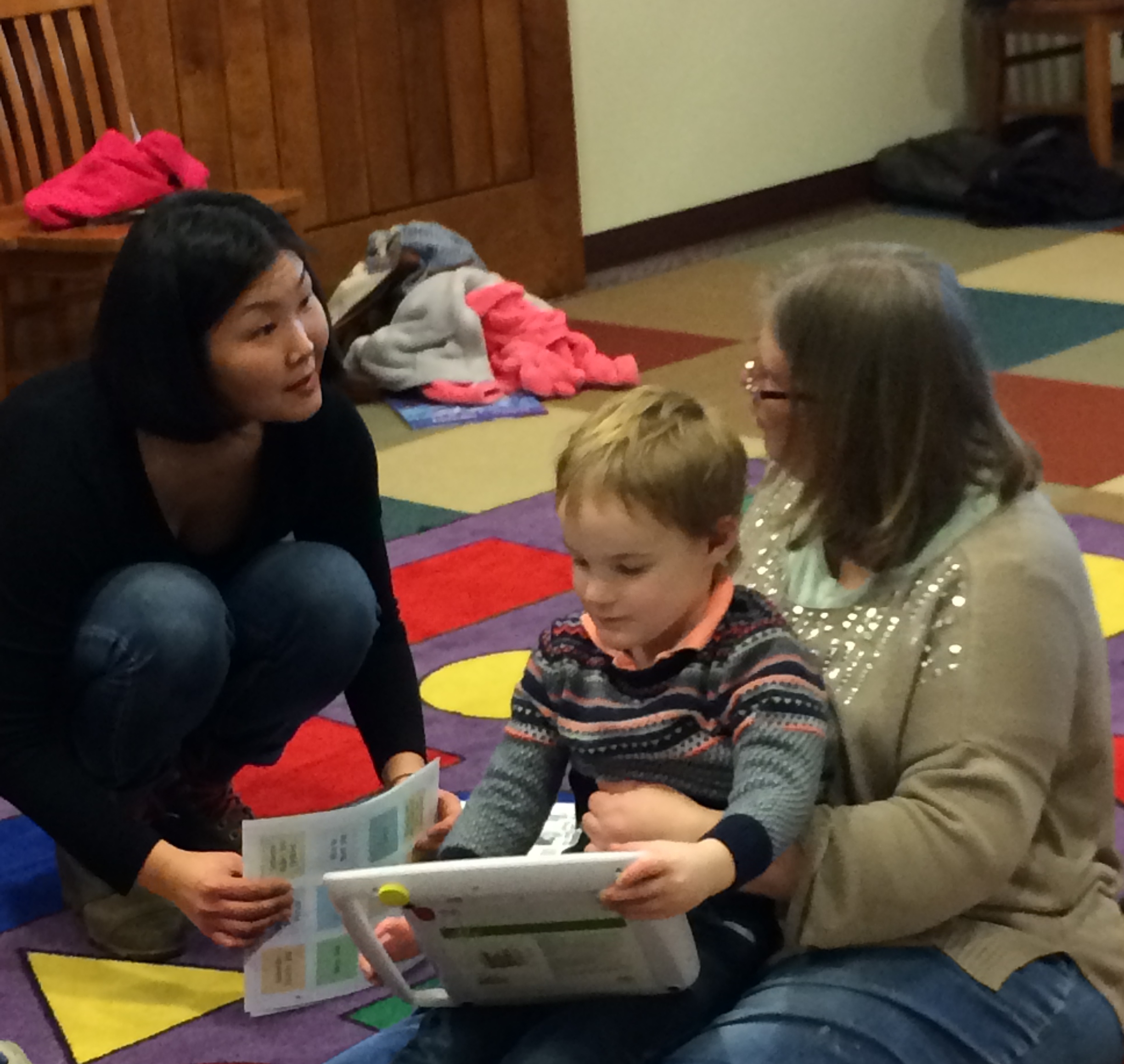“There is no substitute for books in the life of a child” by Mary Ellen Chase (1952), American teacher and author, captured the importance of reading for children in the above quote.
The benefits of reading include improved language and communication skills, better speech skills, increased academic success, and enhanced concentration and attention to tasks. Some children, however, especially those with complex communication needs due to sensory, motor, intellectual or cognitive disabilities, need additional support in order to interact with books and engage in the early literacy activities that are fundamental to reading and writing success. These supports include adapted books and use of assistive technology, visuals and strategies that enable children to participate meaningfully in groups such as fidgets, visual prompts and social stories.
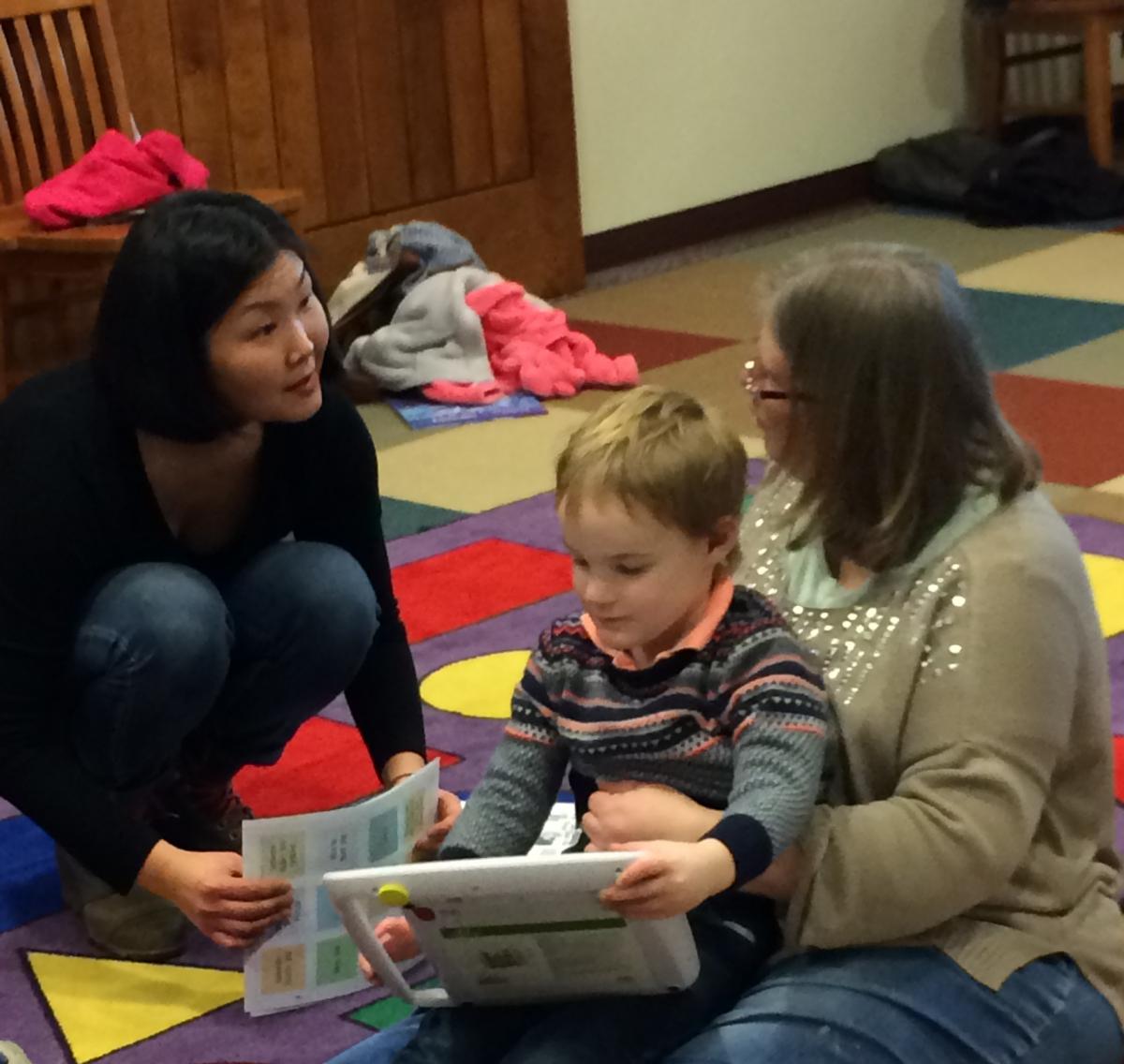
Introducing children to the magic of reading is one of the primary missions of the public library. Through interactive storytime programs, children have the opportunity to engage in literacy-rich activities that promote early reading, provide parents with important models of how to engage their children with books, and develop a connection with the library that can become a valued lifelong resource.
The Inclusive Storytime Program
The Inclusive Storytime Program began at the Hillsboro Public Library in Hillsboro, Oregon, and has since moved to a remote format. The program aims to provide equal access to the activities offered during the storytime experience that promote early literacy skills linked to reading and writing success in school. The program is run by the faculty at Portland State University (PSU) with an interest in literacy along with a steady group of volunteers with experience and training in working with children with disabilities. The Inclusive Storytime Program welcomes all children to enjoy the storytime experience, as well as gain skills in sound-symbol associations, narrative, print awareness, vocabulary and early writing, skills predictive of future literacy success.
“I love seeing their progression,” says Crystal Loman, one of the Project Coordinators. “Children who are not used to coming into library spaces, or haven’t been able to participate in other library programing, are now becoming regular visitors and users of this community resource. It’s wonderful to hear updates from families, whose children have moved on to grade school programs, who report how their children are doing. It feels so good to know that we were able to provide a small step in their progression to become readers and eventually adults part of our larger community.”
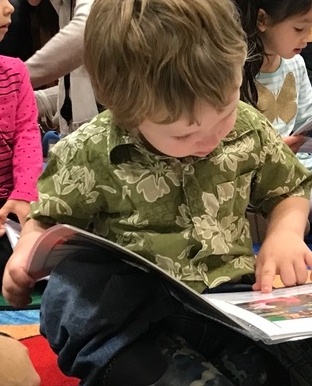
Meet Two Examples of Children Who Have Been a Part of Our Inclusive Storytime Program:
Remy
Remy, a bright, energetic, three-year-old enters the library and quickly chooses his spot on the carpet. Remy was prepared for the group storytime experience by reading a social story at home that describes what will happen and how he will participate. He knows that there will be a visual schedule to help him transition from activity to activity, and is familiar with the repetitive songs and structure that will help him fully engage in the session. Remy holds his favorite “fidget” and is ready to sing the familiar book song paired with symbols designed to support all children to be active participants in the routine. Books are chosen based upon the interests and language abilities of the children and supporting visuals and activities are carefully designed to support the early literacy skills that the children will need to be “school ready.”
Stacey, Remy’s mom, says, “The visuals and take-home activities help Remy the most. Also, having access to fidgets and the ability to move around if he needs to.”
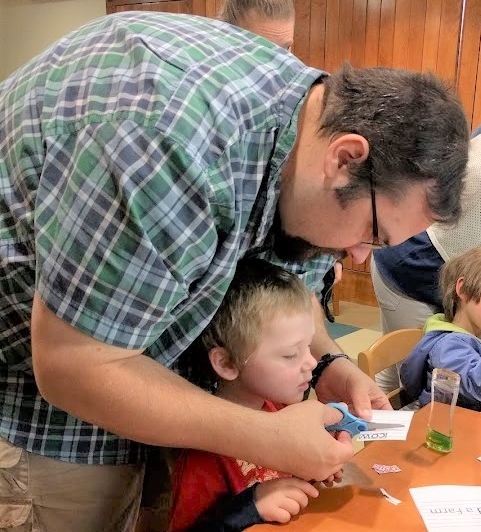
Aubree
The theme for this week’s session at the library is getting ready for summer. Aubree, who is five, is excited to read one of her favorite Pete the Cat books, Pete the Cat and the Magic Sunglasses. Aubree uses a head-switch to activate a recording of the song from the book so she can sing along with the group. All of the children will wear sunglasses and help retell the adventures of Pete by sequencing pictures on individual schedules made of paint sticks with pictures attached to velcro. Other activities to support this summer theme include “writing” a book about all the things the children will “see” in summer, learning about the sound “P” makes using a picture mnemonic of their favorite character, Pete the Cat, and a thematic craft. Core vocabulary boards with words and symbols to request “more” materials, and making choices by indicating what colors and shapes they “like” enable all children to communicate while decorating their foam visors as part of a summer craft activity.
Parents play a key role in the storytime sessions. Facilitators, including some graduate students from PSU’s special education program, model how to use visual supports, engage their children with books, and experiment with simple assistive technology during the sessions. A take-home sheet with activities to follow-up at home and symbol supports for children who need them were provided for each session.
In moving to a remote option, we had to find a way to deliver these materials so that children could continue to participate in a meaningful way. Pam Graves, Program Coordinator for Inclusive Storytime, prepares activities and supports to facilitate maximum engagement and disseminates them via an online platform for parents to download in advance. Pam states, “Although in-person programming is certainly preferable, our move to virtual has enabled us to reach a wider audience, including families from outside our district and even outside of the state.”
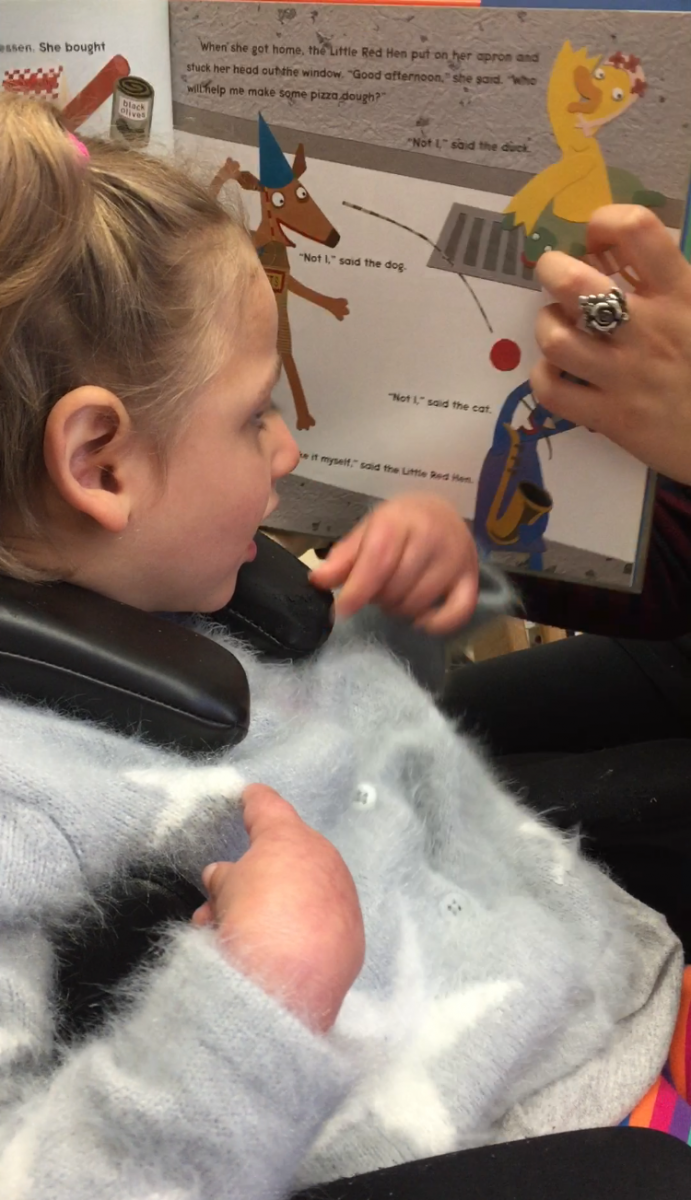
Expanding to Online Inclusive Book Clubs
In spring 2020, opportunities for children with disabilities to receive academic instruction were limited due to school closures and formats that were hard to access for many families during the pandemic. Our team expanded their offerings to children and families by creating online inclusive book clubs that utilize the principles of Universal Design for Learning (UDL), the framework used to develop the Inclusive Storytime Program. Inclusive book clubs titled All About the Alphabet (for kindergarten and first grade students) and Graphic Novel Groupies (for older elementary-aged children), provide additional contexts for teacher candidates to work alongside faculty who can model explicit instruction and other evidence-based practices while serving the community. All About the Alphabet is an online group that meets twice weekly to provide explicit instruction in alphabet knowledge, phonemic awareness, and engagement in shared reading. Graphic Novel Groupies also meets twice weekly and provides opportunities for students to share a love of graphic novels while getting instruction in literacy skills.
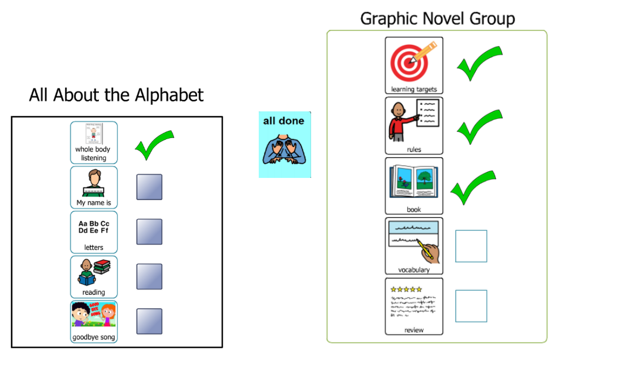
Tiffany Jones, Associate Professor, co-facilitated the Graphic Novel Groupies book club with graduate students in the special education initial teacher licensure program at Portland State University. Book club participants included children 7-10 years old residing in the states of Oregon, Florida, and a family that traveled between Oregon and Mexico over the course of the year. The impact of remote/distance learning on the academic and social emotional well-being of students is a primary concern as schools have struggled with high rates of absenteeism and academic regression. Over the course of the 2020-2021 school year, two graphic novel groups and a total of 18 learners in grades 2-5 participated in online instruction twice weekly. It was rare for students to be absent, the groups welcomed and were inclusive of students with and without disabilities, and the number of participants more than doubled across the course of the year.
Tiffany says, “It’s been an honor to work with families and children in a virtual environment during this time. The groups have provided children with additional social and academic outlets during a time when face-to-face instruction was limited or non-existent due to the pandemic. I will never forget the tearful words of a grandmother as she sat beside her 10-year old grandson who has cerebral palsy and complex communication needs. ‘Tyler loves reading now. He reads everything he can get his hands on and I never thought we’d be at this place with him.’ On another day, 8-year-old Michael looked into the screen and innocently asked why a child with complex physical, sensory and communication needs used a speech generating device (SGD) to participate. The child’s mother was able to answer without hesitation ‘because Harriet’s voice doesn’t work like yours.'”

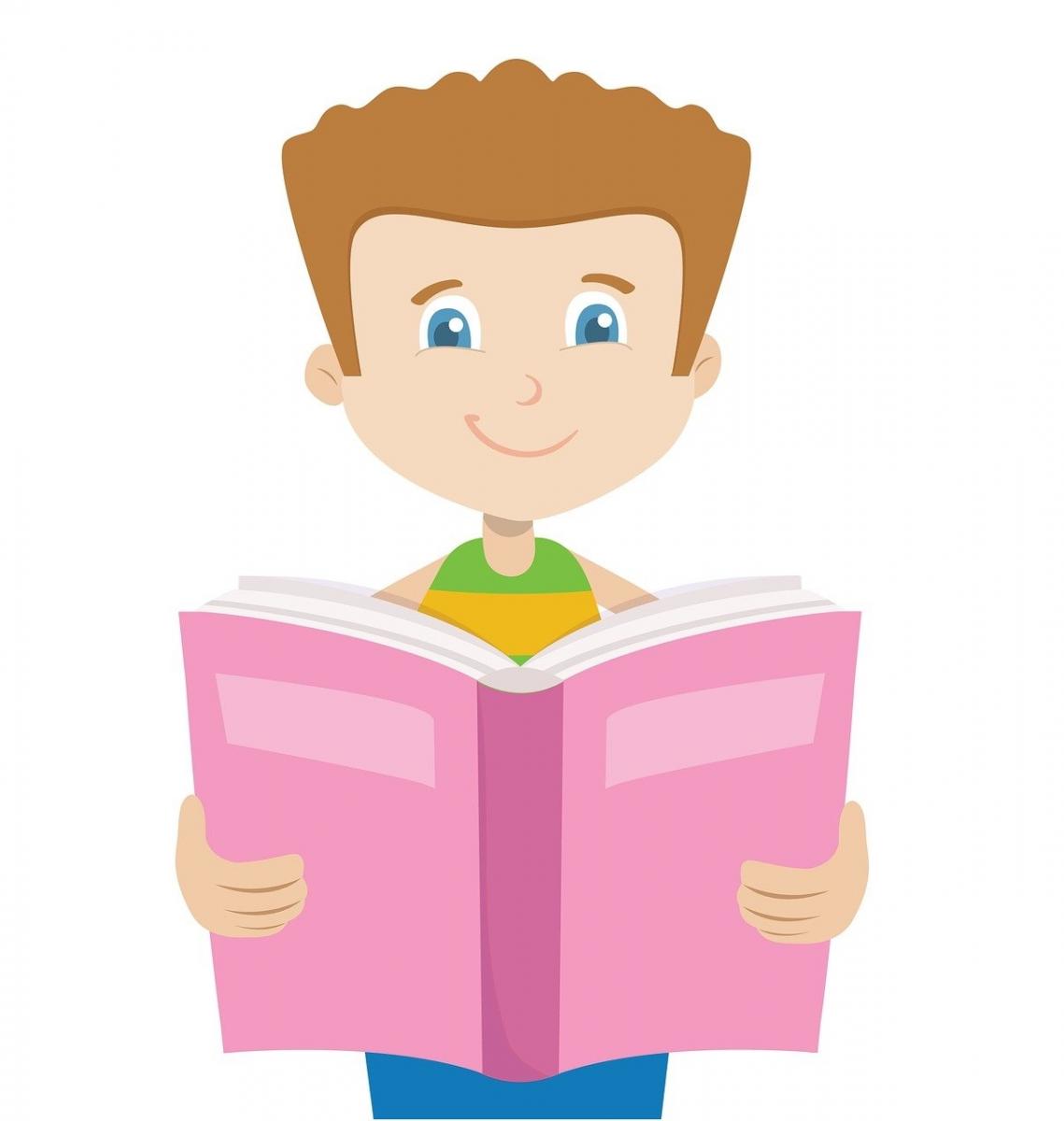
Participants of the online groups can learn about each other in an environment that celebrates the differences of others and recognizes the unique contributions of their peers, while sharing an interest in books. These are the precious moments of exchanges between a professor, graduate students, parents/caregivers, growing together academically, socially, and emotionally in a virtual space during a pandemic. In traditional pre-service field placements, logistical limitations may prevent teacher candidates from teaching foundational literacy skills to students with a wide range of instructional needs.
In moving to online programming, the Inclusive Storytime and Inclusive Book Clubs provided opportunities for pre-service teacher candidates to supplement in-person field experiences with targeted, research-aligned experiences in literacy. Many teacher preparation programs at PSU incorporated aspects of the Inclusive Programs into foundational literacy coursework. In the special education initial teacher licensure program, teacher candidates enrolled in the elementary reading methods course provided one-on-one online tutoring to students in the Inclusive Programs in phonemic awareness and alphabetic principle. In other courses, teacher candidates could earn additional field hours by observing and participating in Inclusive Programs, such as leading a read aloud activity, assisting faculty in creating visual aids and manipulatives, and following a scripted protocol to model and guide practice opportunities in print awareness and phonological awareness skills.
Partnerships Between Public Libraries and Teacher Preparation Programs
Shaheen Munir-McHill, Assistant Professor of Practice and Special Education K-12 License Program Coordinator, taught the elementary reading methods course in Fall 2021, and shared the power of teacher candidate participation in the Inclusive Programs: “Before my teacher candidates began tutoring, many of them struggled to see how to implement the practices they were learning about, particularly if they were working with students with complex needs. After the tutoring experience, teacher candidates reported the value of getting to develop an ongoing relationship with a student and having repeated opportunities to practice and refine their instructional delivery skills.”
Partnerships between public libraries and teacher preparation programs are poised to play a critical role in supporting the literacy skills of the community. For children with disabilities, these online groups provide another avenue to help nudge the reading and writing skills that are so important in their future school experience. The Inclusive Storytime Project is currently holding online sessions on the second and fourth Friday of each month. According to Stacey, Rory’s mom, “Storytime has become an extension of school and gently reinforces all of the important skills he will need to be ready for kindergarten.” All About the Alphabet is also meeting twice weekly online.
For information in the Inclusive Storytime Project and the Inclusive Book Clubs contact Melissa Pebly, EdD, Assistant Professor of Practice, Portland State University, College of Education, Department of Special Education at mpebly@pdx.edu
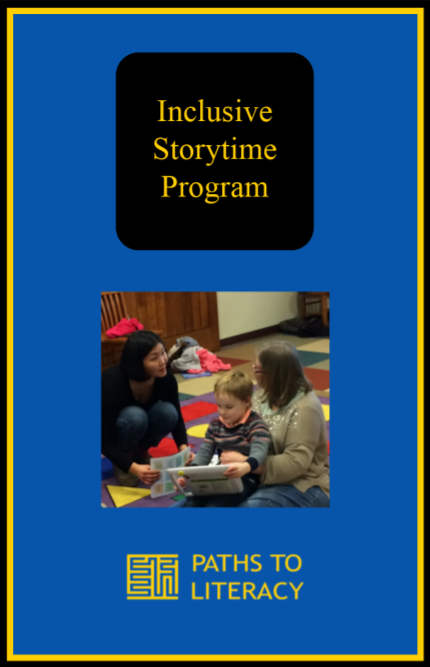 ,
,

